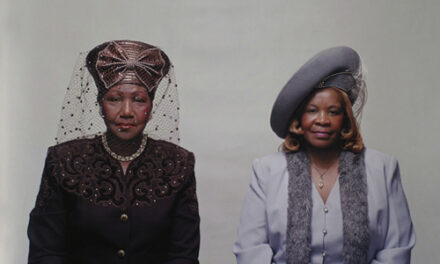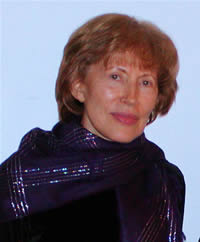How have I missed knowing about the opera Tartuffe, by Kirke Mecham? It was premiered at the San Francisco Opera in 1980 and by late 2002 had already had some 260 performances in some 70 productions, world-wide. The composer made his own libretto, in English, based on the great Molière play, and it has been translated into Chinese, Czech, German, Japanese, and Russian. It has gathered effusive reviews everywhere it has been performed, and a May 4 performance by the NCSA’s A.J. Fletcher Opera Institute fully confirmed the reasons for the opera’s acclaim. The intimacy of the Agnes de Mille Theater, which allows everyone easily to see the subtlest facial expressions, greatly contributed to the effectiveness of this brilliant production by Stage Director William Graham. This is very much a virtuoso ensemble opera, and at the opening-night performance everyone onstage and in the pit was in full fighting mettle. It was a fast paced, “white hot” evening of complete theater.
In Molière’s play, Orgon, a wealthy Parisian Orgon attempting to regain control over his family, has fallen under the domination of Tartuffe, a hypocrite who poses as a “guru” of humble piety. This con man’s intent is to seduce Orgon’s second wife, Elmire, to marry his daughter Mariane, and to get as much of the family’s wealth and property as possible. Efforts by Orgon’s hot-headed son Damis and Mariane’s maid Dorine and her fiancé Valére backfire badly, resulting in Orgon deeding his house and goods to Tartuffe. In a great comic scene, Elmire has Orgon hide under a table to overhear Tartuffe’s attempted seduction. As Tartuffe grows more indiscrete, Elmire desperately attempts to signal Orgon to intervene by means of a cough that is taken up by much of the orchestra. With three characters in disguise carrying out elaborate stratagems (worthy of a Handel opera seria or several Rossini opera plots), the family eventually gets back the deed. Mecham has pared Molière’s text down to the basic necessities, and he rivals Benjamin Britten and Virgil Thomson in his musical settings of the English language.
There is not a single weak member in the splendid cast of singers from the Fletcher Opera Institute. All sang without any signs of strain, everyone was at ease within the vocal ranges, and the diction was excellent. Some vibrato seemed almost excessive but I believe this was part of Mechem’s send-up of operatic conventions. Bass Jonathan Merritt, the Commendatore in last season’s Don Giovanni at the NCSA, brought his sepulchral resonance to the role of the oafish Orgon. Bursting with barely contained rage, tenor Brian Schumaker’s fine voice was welcome in the role of Orgon’s fiery but dim-witted son Damis. Sara Pardo’s solid technique and secure high range was welcome in the role of Mariane, Ogon’s daughter. The lyric tenor voice of John Kawa, as Mariane’s fiancé, was ideal for a yearning lover and provided excellent contrast to Schumaker’s dramatic tenor in many ensembles. Wearing a nose that seemed to come from the Wicked Witch of the West in Oz, mezzo-soprano Jessie Sargent, a NCSA senior, held her own as the overbearing mother of Orgon. As her maid Flipote (and singing only in the finale), Holly Wengenroth carried out her stage business with professional aplomb…, never upstaging anyone.
Because of the depth of characterization and breadth of musical range that Mechem put into the roles of Elmire and Dorine, I single them out for more attention. The role of Dorine combines qualities that are found in sharp-witted and interfering servants such as Despina in Mozart’s Così fan tutte and Adele in Strauss’ Die Fledermaus with the spectacular high note display of Zerbinetta in Richard Strauss’s Ariadne auf Naxos. Rarely off stage for long and often tartly commenting on the action on stage, soprano Kristen Yarborough seemed inexhaustible. Her ideal sense of comic timing was surpassed only by her robust voice and brilliant and seemingly-effortless high notes. Mechem poured the greatest depths in this opera into the role of Orgon’s long-suffering second wife Elmire. Dramatic soprano Dawn Pierce plumbed the core of this role, paying careful attention to nuances of expression and emotions. Act III opens with a splendid piece in which Elmire reflects upon men, women’s relationships with them, and an unromantic view of human loneliness. This would make an effective addition to any vocal recital. Poulenc-like, the composer pricks the balloon of seriousness and pops back quickly to comedy. Pierre’s attempts to seduce Tartuffe – and above all, her coughing signals to get Orgon to come out of hiding – were comic tours de force worthy of the best of the Marx Brothers.
Baritone Alphonso Cherry triumphed in the role of the smarmy Tartuffe, marrying firm vocalism and clear diction with a wide range of facial expressions and perfect comic timing. I wonder if he drew upon David Alan Grier’s portrayal of phony evangelist Rev. Leon Lonnie Love, as seen on the TV sitcom Martin? However and whatever the sources, his blends of tics and affectations were priceless. Cherry is a singing-actor of enormous range. CVNC has reviewed his Leporello in Don Giovanni and his portrayal of the tragic title role in Donizetti’s Belisario.
Members of a small chamber orchestra played their hearts out under the able direction of conductor James Allbritten. The fine unit set – a late-19th or early-20th-century dining room – was designed by Daniel Tobias. The lighting, by Robert Fabrizio, was effective as were the costumes, designed by Su-Jung Lee. The composer joined the full cast and directors for the curtain calls.
Run – don’t walk! – to catch the remaining performance of Mechem’s delightful Tartuffe. For details, see our Triad calendar.












